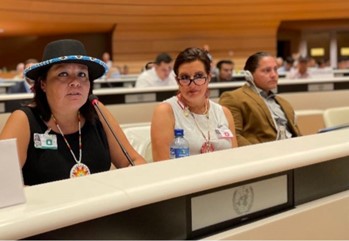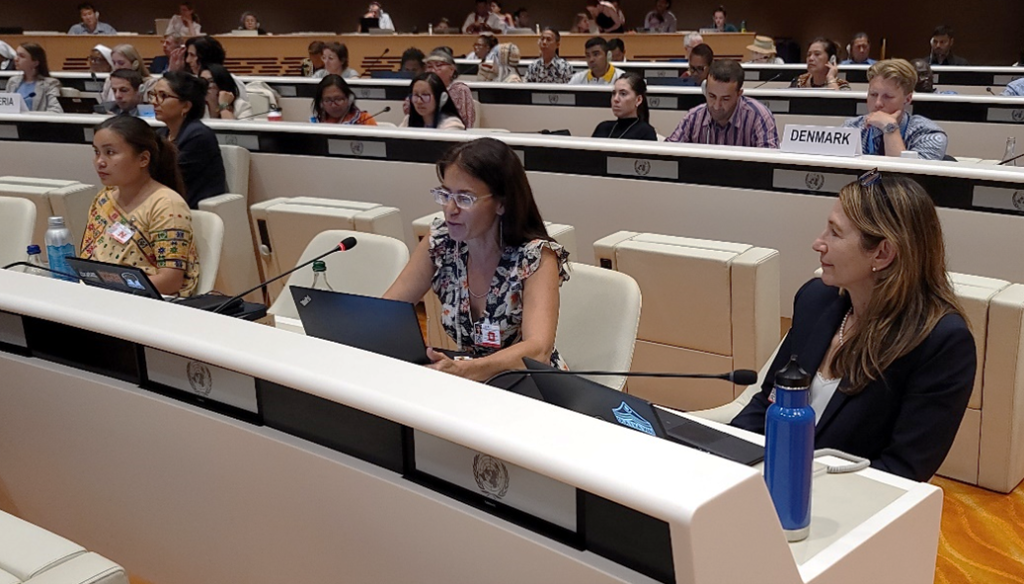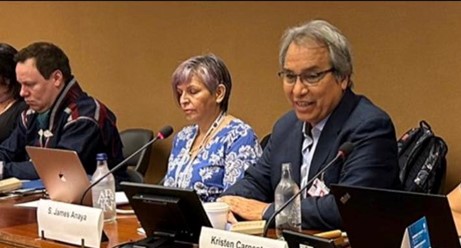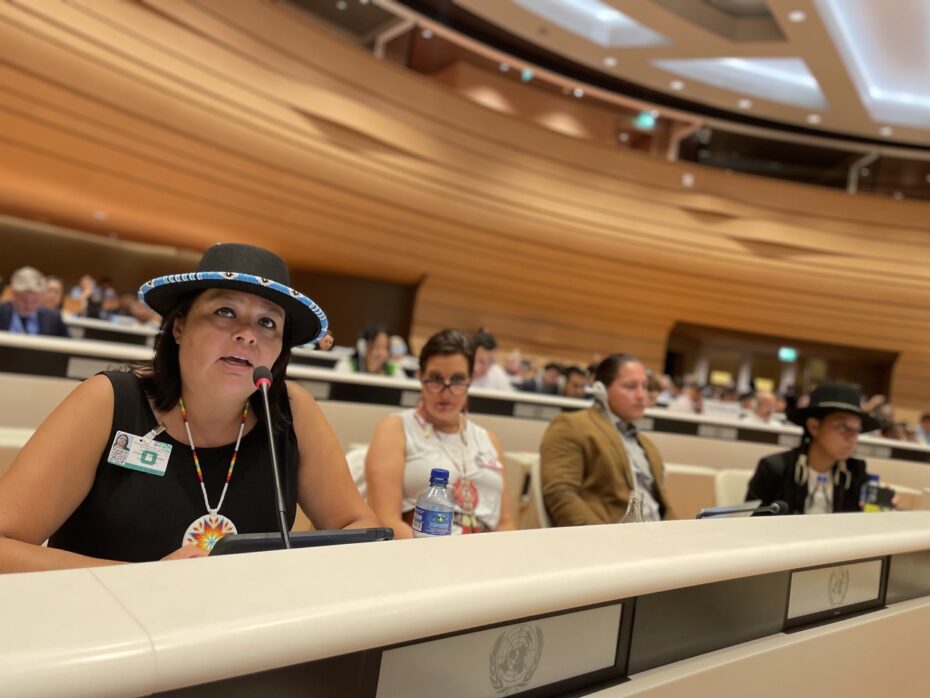August 2nd, 2023
Media Share from the The Implementation Project
Original article can be found at https://un-declaration.narf.org/emrip-july-2023/
The Implementation Project at EMRIP: Supporting Indigenous Peoples’ Calls for the U.S. and World Community to Protect Tribal Treaty Rights, Support Language Revitalization, and Enhance Indigenous Peoples’ Participation at the United Nations
By Emiliano Salazar, University of Colorado American Indian Law Program Fellow
July 27, 2023
The 16th Session of the Expert Mechanism on the Rights of Indigenous Peoples (the Expert Mechanism or EMRIP) opened on July 17, 2023, and concluded July 21, 2023. Indigenous Peoples, State representatives, and a number of organizations gathered to engage in dialogue regarding the rights of Indigenous Peoples. EMRIP is mandated to advise the United Nations Human Rights Council and to advance the aims of the UN Declaration on the Rights of Indigenous Peoples (the Declaration). The session culminates with an annual report and submission of studies to the Human Rights Council, comprised of 37 Member States including the United States (past EMRIP reports and studies are available here).
The Implementation Project (TIP) was represented by Co-Directors Kristen Carpenter, Council Tree Professor of Law and Director of the American Indian Law Program at the University of Colorado Law School, and Sue Noe, Senior Staff Attorney at the Native American Rights Fund, along with Emiliano Salazar, University of Colorado American Indian Law Program Fellow.
A highlight for TIP was supporting the Coalition of Large Tribes (COLT) at the session. COLT represents the interests of the more than 50 tribes with reservations of 100,000 acres or more, and approximately one million American Indian people in the U.S. Led by COLT Treasurer and Rosebud Sioux Councilwoman Lisa White Pipe, the COLT delegation included Bo Bearshield, Michaela Red Cherries, and Jennifer Weddle. The delegation made official interventions from the floor, met with U.S. State Department representatives, and participated in a side event on sacred sites and human rights with Indigenous leaders from Norway, Australia, and the U.S. (See Speaking at the United Nations, COLT Treasurer White Pipe Calls on the U.S. to Provide Greater to Support to Indigenous Languages as part of Indian Boarding Schools Healing Work | Coalition of Large Tribes.)
White Pipe stated, “COLT is committed to holding the U.S. accountable for violating tribal treaty rights and the harms perpetuated by the federal Indian boarding schools. We will go wherever we need to protect our people and lands. Our presence at the United Nations is part of an advocacy strategy at the tribal, federal, and international levels to advance our sovereignty and human rights.”

Councilwoman Lisa White Pipe, Jennifer Weddle, and Bo Bearshield at the 16th Session of the United Nations Expert Mechanism on the Rights of Indigenous Peoples.
Councilwoman White Pipe made an intervention on “Item 5: Interactive Dialogue with the Expert Mechanism on the Right to Development.” White Pipe’s statement emphasized that only healthy communities can pursue the right to development. She called for an EMRIP country engagement in the U.S. to advance remedies for the harms to Indigenous Peoples’ languages, health, and wellbeing caused by federal Indian boarding schools. Watch Councilwoman White Pipe’s intervention on UN Web TV here.
Language rights was a strong theme of the session, and Carpenter made an intervention on behalf of Colorado Law’s American Indian Law Program during “Item 7: International Decade of Indigenous Languages.” She highlighted Visions for the International Decade of Indigenous Languages 2022-2032, a publication in which Cherokee Nation Principal Chief Chuck Hoskin, Jr, called on the U.S. to announce a national action plan for the decade and tribal leaders, linguists, and teachers identified good practices and challenges in language revitalization. Carpenter noted the opportunity for the U.S. to prioritize Indigenous Peoples’ language rights, sacred sites protection, and international repatriation as it rejoins the United Nations Educational, Scientific, and Cultural Organization this year. Watch Co-Director Carpenter’s intervention on UN Web TV here.

TIP Co-Directors Kristen Carpenter and Sue Noe make interventions at the EMRIP Session.
Noe made an intervention on behalf of the Native American Rights Fund and the National Congress of American Indians during “Item 9: Interactive dialogue with UNPFII, the Special Rapporteur on the Rights of Indigenous Peoples, and the UN Voluntary Fund for Indigenous Peoples.” Noe highlighted the need for Indigenous Peoples to have full and effective participation in an upcoming diplomatic conference at the World Intellectual Property Organization to negotiate a legal instrument on Intellectual Property, Genetic Resources, and Traditional Knowledge Associated with Genetic Resources. Watch Co-Director Noe’s intervention on UN Web TV here.
The Implementation Project held a side event on July 19, 2023, entitled “Sacred Sites and Human Rights: Implementing the UN Declaration on the Rights of Indigenous Peoples’ Articles on Religious Freedoms, Free Prior and Informed Consent, and Rights to Land & Water.” Panelists were S. James Anaya, Distinguished Professor at the University of Colorado Law School and Former UN Special Rapporteur on the Rights of Indigenous Peoples; Hannah McGlade, Member of the UN Permanent Forum on Indigenous Issues; Eirik Larsen, Political Advisor to the Sami Parliament in Norway, and Councilwoman White Pipe. Commenters were newly appointed Chair of EMRIP Sheryl Lightfoot and Vice-Chair Antonina Gorbunova. The presentations converged around the sacred relationship between Indigenous Peoples and their lands, values that are inadequately protected by current laws. Panelists discussed the Black Hills, Oak Flat, and Thacker Pass (all in the United States); Juukan Gorge (Australia); and Fosen (Norway)—places where Indigenous Peoples are advancing a human rights framework to address the inadequacy of local and national laws.

Eirik Larsen, Hannah McGlade, and James Anaya at TIP Side event on Sacred Sites and Human Rights.
Kristen Carpenter, who served on EMRIP from 2017-2021, was recognized during “Item 6: Country Engagement” for work completed during her time as Chair of the Mechanism. During this time, EMRIP assisted the Yaqui People, a cross-border Indigenous nation from the U.S. and Mexico, in their claim to repatriate a ceremonial deer head known as the Maaso Kova from Sweden. As EMRIP’s chair, Carpenter facilitated dialogue among Sweden and the Yaqui, leading to a 2020 agreement and the ultimate repatriation in 2023. The Yaqui-Sweden matter was hailed as a standard for EMRIP country engagements, which aim to give practical effect to the UN Declaration on the Rights of Indigenous Peoples.
The Expert Mechanism’s thematic study for the 16th session was on the impact of militarization on the rights of Indigenous Peoples. Together with representatives of Indigenous Peoples from around the world, a representative from Hawaii made a statement speaking of the effects that U.S. military bases have had on Native Hawaiians. A common theme reported by Indigenous Peoples all over the world was the effect militarization has had on women and young girls and how special attention is needed for those populations.
This session also commemorated the 100-year anniversary of Deskaheh Levi General traveling to the League of Nations to seek redress for Canada’s violation of treaties the Haudenosaunee made with the British Crown in Canada. The current Deskaheh Steve Jacobs attended the session and gave a short version of the Haudenosaunee Thanksgiving address during the opening. Deskaheh Steve Jacobs refused to speak thereafter. His silence highlighted the fact that even 100 years after Levi General first arrived in Geneva, the Haudenosaunee are still not recognized as a sovereign nation within the UN system, underscoring the need for enhanced participation at the United Nations.
The Expert Mechanism concluded the session with a list of proposals discussed throughout the session. Of note were proposals on protecting Indigenous leaders against reprisals for speaking out on human rights violations in their home countries. The Expert Mechanism stated that Indigenous Peoples should be able to participate without fear of intimidation, harassment, or reprisals of any sort and called upon States to behave with integrity and respect for Indigenous Peoples. Once published, the recommendations and thematic studies should be found on the Expert Mechanism’s website.
To see more of our work, follow us on LinkedIn and contact The Implementation Project at declaration@narf.org.

